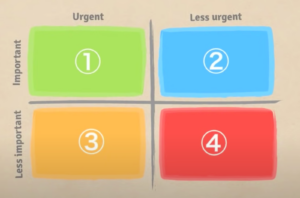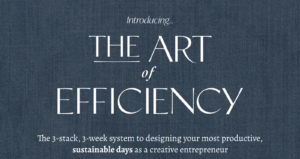Part of being an entrepreneur means having a lot of great ideas.
You have a great idea in the shower, while working on your latest project, or while talking to a client.
But as much as you want to work on all your ideas, you know that’s not sustainable. You can’t do everything!
Being able to prioritize and focus on the most important thing is an invaluable skill set for an entrepreneur — but it’s not a skill set that often comes naturally. It takes time and work to build up that “prioritizing muscle.”
In this post, I’m going to talk about how I have cultivated a decision-making mindset, and how I figure out what’s important each day. Because I have been sidelined by Shiny Object Syndrome in the past, but I don’t want you to be!
So let’s talk about how to determine priorities as an entrepreneur and business owner — so you can do the work that makes an impact.
My personal decision-making process
I want to kick things off by telling you about the three-part matrix I’ve used that has absolutely changed the way I think about goal setting and priorities.
It’s how I know something is important because when I make a decision, it passes these three green lights.
- Will it move my business forward or backward? This is a neutral question, with no feelings or opinions attached. It just is what it is.
- Will this decision affect the cash flow of my business? This is helpful to know because when I’m making decisions, it’s easy to get caught up in the weeds and pay too much attention to things that don’t matter that much big picture. I have to continually set my mind back on, “I am running a business here. We have to make a profit. It’s not just an expensive hobby. It’s got to work.”
- Is this urgent…really? If it’s not, then it can probably wait until I have time to work on it.
Now that you know how I pick what’s important, the next six things are going to show you the strategy of how to determine priorities as an entrepreneur!
Tip #1: The Eisenhower Matrix
Good old President Ike. He developed this matrix to help explain decision-making, and it essentially plays off of a four-part grid.

The things that are “most important” and also “not urgent” are going to be in one category, and those are the things that you probably need to set aside in your calendar.
Think about this being things like exercising, loving on your family, taking care of yourself, and developing your faith. The things that are bedrock pillars in your life or in your business that need attention for the other things on the grid to work.
And this probably goes without saying, but if something falls into the “not important” and “not urgent” boxes, then it’s honestly worth getting off your plate altogether. Delegating it, eliminating it, you get the idea.
Tip #2: The Big Two
The next tip is a little learning I gleaned from Peter Drucker’s book, The Effective Executive — an old-school classic about leadership and business.
In it, he talks about prioritizing the two most important things you can do for your biz each day. And I totally agree — I’ve found that focusing on just two things each day is my sweet spot. I’m able to get more done in less time and it helps me avoid shiny object syndrome.
Give it a try — it might work for you too, especially if you’ve found the big three method to be a little too overwhelming!
Tip #3: Be consistent
The next tactic that I employ is looking at my goals every day. If not every day, at least multiple times during the week.
I also don’t really create annual goals, FYI. I have a vision of what the year is going to look like, but as far as the smart goals and making them measurable, I only do that for one quarter at a time.
But doing that has helped me with my daily goals. Every day when I sit down, I’m looking at what those goals are. And here’s the key to it all — part of being an entrepreneur is looking at those goals, yes, but also holding them with loose hands.
That way, if things fall through the cracks, or you need to shift, you’re not so bought into them that you can’t adjust. And if you’ve been in business for any amount of time, you know that’s bound to happen.
And trust me friends, letting go of that need for everything to be perfect can really work wonders for your productivity! Because truthfully, consistency is more important than “getting everything done” anyways.
Tip #4: The zero-sum game
If something is going into your calendar or to-do list, something’s gotta come out. You cannot do all of the things!
I’m sure you’ve heard quips about this, like, “If something isn’t a ‘heck yes’ then it’s not a yes,” but to me, this is so important. It’s one of those blanket mentalities that I bring into every single day.
And this strategy is helpful because you have to get good at balancing your tasks to know what can be adjusted and what can’t.
Tip #5: Add numerical weight to each task
Give things a numerical weight if you’ve got it on your calendar. I always prioritize tasks from a level one to level three. Three is of the utmost importance, and ones are not so much. Nice to haves but not need to haves.
Doing this helps me siphon through my tasks for the day and determine what’s the big two that need the most attention and are the highest priority.
Tip #6: Have a dedicated place to jot down ideas
Always, always, capture an idea or a task to put it somewhere safe. You won’t always be in a position to put your shower thoughts in your nice and neat Asana board when inspiration strikes.
So make sure you’ve got somewhere you can write them down, like a notebook on your bedside table, or in the notes app of your phone.
Having a system to tell your brain, “Great idea, brain. Not now. Now is not the time for that. We’re going to put that over here,” is a great, subconscious, way to help you file priorities in your head.
Have that mantra on repeat in your head — “That’s a great idea, but not right now.”
Want more time management tips? I’ve got you covered inside The Art of Efficiency!

This three-stack, three-week system was created to help you find ways to carve out more efficient systems as an entrepreneur. Learn how to give your brain the system it needs to avoid shiny object syndrome — join the waitlist here!
Reading Time: 5 Minutes Reading time: 5 min. Part of being an entrepreneur means having a lot of great ideas. You have a great idea in the shower, while working on your latest project, or while talking to a client. But as much as you want to work on all your ideas, you know that’s not sustainable. You can’t […]



comments +